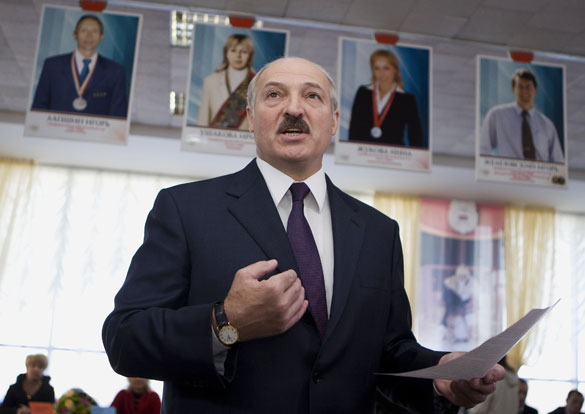Belarus Dictator Popular? How Would We Know?

I recently drew attention in an article for FrumForum to the imminent threat to the life of Andrei Sannikov, the pro-democracy opposition leader of Belarus, Europe’s last dictatorship. Robin Tim Weis’s riposte to my piece coincides with news that Sannikov has disappeared. If nothing else, this should prompt us to question the policy of gradualism in dealing with dictatorships.
Robin's article makes some interesting points, but there are too many contradictions packed into his argument. Robin says that the regime of Alexander Lukashenko is "upheld by the genuine appreciation of the majority of Belarusian people for their president, rather than the iron grip of the KGB". If this is true, why does the KGB exercise an iron grip? If Lukashenko enjoys genuine popularity among Belarusians, why does he fear an open contest? Why do his opponents ineluctably end up in the vast network of prisons - or, worse, disappear? Why is public assembly banned in Belarus?
The idea of Lukashenko's domestic popularity is an untested axiom - often stated, but never proved. The only way to test its validity is through the ballot. But Lukashenko will not consent to free and fair elections. Why?
It is true that Lukashenko did enjoy the support of a majority of Belarusians in the immediate aftermath of the Soviet Union’s collapse. An event that seemed like the end of history to triumphant spectators in the West was, for many Belarusians, the beginning of an inscrutable future. A populist by instinct, Lukashenko capitalised on their fears, vowing, in the words of one biographer, to “recreate the Soviet Union on a new, higher plane”. He was energetic and youthful, not yet 40 when the first general elections were held in 1994. Pensioners who watched his speeches on television were moved to tears. Dictatorship seemed a distant prospect, given that the speaker of the Supreme Soviet, the interim parliament of Belarus, was averse to the idea of a presidential system. Then Bill Clinton visited Belarus in 1993 – the only visit by an incumbent US president to date – and members of the Supreme Soviet, seduced by the sight of a young and charismatic leader, sidelined the speaker and opted for a presidential system.
Lukashenko won in a run-off election in 1994 – and it took him two years to consign the constitution to the trashcan, introduce the death penalty, have his opponents imprisoned and consolidate his control over the media. Parliamentarians who refused to rubberstamp his laws had their salaries withheld. Lawyers who opposed him were disbarred. By 1999, several prominent figures in the Belarusian opposition had disappeared. The presidential ukase became the ultimate law of the land. As a Belarusian legislator at the time phrased it: "Why are we sitting here? Why are we passing laws?" The image of the traditionalist babushka offers an uncomplicated explanation for Lukashenko’s hold on power. But it is an obsolete picture. Lukashenko’s rule is underwritten by force.
Individual tales of repression can produce mass action only if they are able to coalesce into a collective narrative. In order to challenge Lukashenko, Belarusians must be able to do something as simple as talk among themselves. After last year’s abortive uprising, the political space of the opposition has shrunk to the point of extinction. Virtually every opposition leader is under house arrest – and every opposition activist under surveillance. Those who participate in politics find their employment contracts phased out. The Belarusian opposition is trapped in a zugzwang: their progress is possible only through loss. Belarus under Lukashenko resembles not so much a country as a desolate captive.
How will Lukashenko go? In suggesting economic pressure as the "only" solution, Robin overlooks the fact that the void created by the West could potentially be filled by China and India. Belarus’s current economic woes are crippling. But it’s worth noting that when the US imposed fresh sanctions earlier this year, Lukashenko was rattled only momentarily: within weeks, China had agreed to help, offering not just a billion dollars, but also an assurance of "full backing for [Lukashenko's] stance on domestic and international questions". Lukashenko has promised China a "stronghold in Europe".
Robin closes his closes his piece on a hopeful note: "Only organically cultivated resistance and 'revolution' can ensure a sustainable change of Belarusian leadership and government". But this sentiment is rather undermined by his suggestion in the preceding lines that the US recruit Belarus as a conduit for negotiations with Iran – which, to indulge the idea for a moment, would confer America’s imprimatur on Lukashnko’s regime. It’s not particularly helpful for the pro-democracy movement if Washington conscripts its nemesis as an ally.
Finally, I agree: It is Belarusians who will ultimately defenestrate Lukashenko. But it would help if the West – particularly the US – didn’t hesitate to speak up for them.

